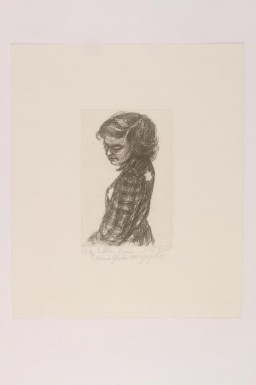<< Previous | Displaying results 751-760 of 6719 for "" | Next >>
-
Max Diamant's identity card (outside)
DocumentIn July 1942, the German health department located in Krakow (Krakau), occupied Poland, issued this identity card to Max Diamant. This view shows the front and back covers of the card. The interior pages identify Diamant as a dental assistant in Przemysl, Poland, and show his signature and photograph mounted under the stamped word "Jew."
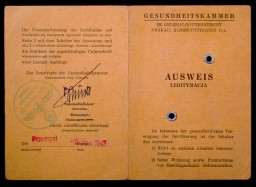
-
Max Diamant's identity card (inside)
DocumentMax Diamant obtained this identity card from the German health department located in Krakow (Krakau), occupied Poland, in July 1942. This view shows the interior pages, which identify him as a Jew and detail his personal information, such as occupation (dental assistant), birthdate (June 23, 1915), birthplace (Vienna), and current address in Przemysl, Poland.
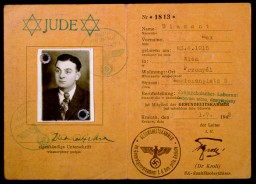
-
Work permit issued to Max Diamant
DocumentDr. J. Rebhan, chair of the Jewish council in Przemysl, Poland, signed this document certifying that Max Diamant had stable employment in the Jewish clinic. The certificate identifies Diamant as a dentist and is dated June 4, 1942. During World War II, the Germans established Jewish councils to ensure that Nazi orders and regulations were implemented. Jewish council members also sought to provide basic community services for ghettoized Jewish populations.
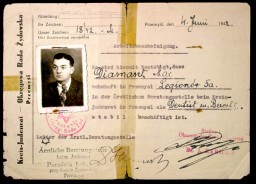
-
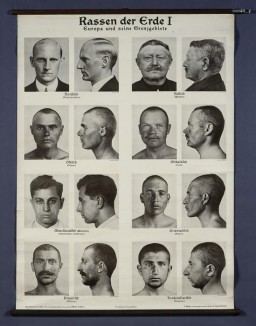
-
Sketch from scrapbook presented during inspection of Djelfa
ArtifactSketch from the scrapbook of Donald Coster presented to him during his inspection of the internment camp in Djelfa. The page is entitled, "Gulliver's travels to Djelfa." Djelfa, Algeria, ca. 1942.
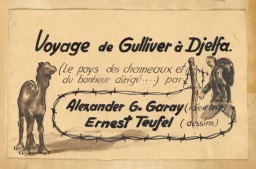
-
Sketch from a scrapbook presented during an inspection of Djelfa
ArtifactSketch from the scrapbook of Donald Coster presented to him during his inspection of the internment camp in Djelfa. The page is entitled, "All roads don't lead to Rome." Djelfa, Algeria, ca. 1941.
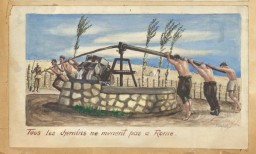
-
German propaganda leaflet for African American soldiers
ArtifactGerman propaganda leaflet targeting African American servicemen, November 1944. The leaflets falsely suggested that African Americans would receive better treatment by the German military and encouraged them to surrender to German troops.
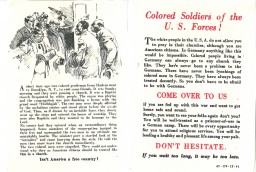
-
Teddy bear carried by a child on a Kindertransport
ArtifactTeddy bear belonging to Jack Hellman as a child. He carried it with him when he left for England from Germany on a Kindertransport in early 1939.

-
Portrait of Masha Rolnik, by Esther Lurie
Artifact"Portrait of Masha Rolnik, Leibisch concentration camp, 1944" by Esther Lurie. This image shows three sketches of Masha Rolnikaite (Rolnik) drawn by Esther Lurie, in approximately 1965, for the cover of Masha's memoir, Ikh muz dertseyin [I have to tell]. They reproduce the drawing of Masha that Esther made when both were prisoners in a forced-labor camp. Esther Lurie was active in documenting scenes of life in the Kovno ghetto and in forced-labor camps. She buried most of her works in the hope that…
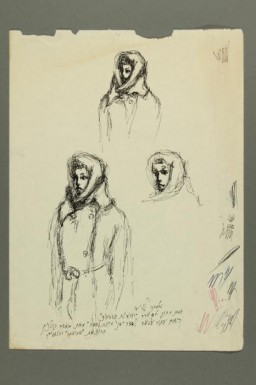
-
Print of "Portrait of a Young Girl with Two Yellow Badges" by Esther Lurie
ArtifactThis image shows a print of a portrait drawing by artist Esther Lurie. Lurie documented scenes of life in the Kovno ghetto and contributed to the secret archives there. The subject of the portrait is a young woman in a checked dress with two Star of David patches. This print is a version of the drawing, "Portrait of a Young Girl with Two Yellow Badges," which Lurie did in the Kovno ghetto and for which she was awarded the Dizengoff Prize in 1946 in Palestine. Because the majority of Lurie's works were…
